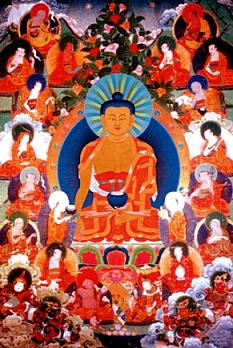Sixteen Arhats: Difference between revisions
Jump to navigation
Jump to search
No edit summary |
No edit summary |
||
| Line 3: | Line 3: | ||
'''Sixteen Arhats''' or Sthaviras (Tib. Néten Chudruk; [[Wyl.]] ''gnas brtan bcu drug''; Skt. ''ṣoḍaśa sthavirāḥ''). The Sthaviras or Elders were disciples of the [[Buddha]] who vowed at the time of the [[parinirvana]] to remain in the world and maintain the [[Dharma]] until the time of the future Buddha [[Maitreya]]. To visualize the [[Buddha Shakyamuni]] surrounded by the Sixteen Arhats and an assembly of [[bodhisattva]]s generates great [[merit]] and quickly develops insight into the teachings of the Buddha. | '''Sixteen Arhats''' or Sthaviras (Tib. Néten Chudruk; [[Wyl.]] ''gnas brtan bcu drug''; Skt. ''ṣoḍaśa sthavirāḥ''). The Sthaviras or Elders were disciples of the [[Buddha]] who vowed at the time of the [[parinirvana]] to remain in the world and maintain the [[Dharma]] until the time of the future Buddha [[Maitreya]]. To visualize the [[Buddha Shakyamuni]] surrounded by the Sixteen Arhats and an assembly of [[bodhisattva]]s generates great [[merit]] and quickly develops insight into the teachings of the Buddha. | ||
#Angaja (Wyl. ''yan lag ‘byung'')<br> | #Angaja (Tib. Yenlag Chung; Wyl. ''yan lag ‘byung'')<br> | ||
#Ajita (Wyl. ''ma pham pa'')<br> | #Ajita (Tib. Ma Phampa; Wyl. ''ma pham pa'')<br> | ||
#Vanavāsin (Wyl. ''nags gnas'')<br> | #Vanavāsin (Tib. Nagna Né; Wyl. ''nags gnas'')<br> | ||
#Mahākālika (Wyl. ''dus ldan chen po'')<br> | #Mahākālika (Tib. Düden Chenpo; Wyl. ''dus ldan chen po'')<br> | ||
#Vajrīputra (Wyl. ''rdo rje mo’i bu'')<br> | #Vajrīputra (Tib. Dorje Möbu; Wyl. ''rdo rje mo’i bu'')<br> | ||
#Śrībhadra (Wyl. ''dpal bzang'')<br> | #Śrībhadra (Tib. Pal Zangpo; Wyl. ''dpal bzang'')<br> | ||
#Kanakavatsa (Wyl. ''gser gyi be’u'')<br> | #Kanakavatsa (Tib. Sergyi Be'u; Wyl. ''gser gyi be’u'')<br> | ||
#Kanaka (Wyl. ''gser can'')<br> | #Kanaka (Tib. Serchen; Wyl. ''gser can'')<br> | ||
#Bakula (Wyl. ''bakkula'')<br> | #Bakula (Tib. Bakula; Wyl. ''bakkula'')<br> | ||
#[[Rahula|Rāhula]], the Buddha's son (Wyl. ''sgra gcan 'dzin'')<br> | #[[Rahula|Rāhula]], the Buddha's son (Tib. Drachen Dzin; Wyl. ''sgra gcan 'dzin'')<br> | ||
#Chulapanthaka (Wyl. ''lam phran'')<br> | #Chulapanthaka (Tib. Lamtren Ten; Wyl. ''lam phran'')<br> | ||
#Piṇḍola Bhāradvāja (Tib. ''bha ra dva ja so nyom len'')<br> | #Piṇḍola Bhāradvāja (Tib. Dza Sönyom Len; Wyl. ''bha ra dva ja so nyom len'')<br> | ||
#Panthaka (Wyl. ''lam pa'')<br> | #Panthaka (Tib. Lamten; Wyl. ''lam pa'')<br> | ||
#Nāgasena (Wyl. ''klu sde'')<br> | #Nāgasena (Tib. Lü De; Wyl. ''klu sde'')<br> | ||
#Gopaka (Wyl. ''sbed byed'')<br> | #Gopaka (Tib. Bé Chépa; Wyl. ''sbed byed'')<br> | ||
#Abhedya (Wyl. ''mi phyed pa'')<br> | #Abhedya (Tib. Michépa; Wyl. ''mi phyed pa'')<br> | ||
Revision as of 00:10, 30 August 2008

Sixteen Arhats or Sthaviras (Tib. Néten Chudruk; Wyl. gnas brtan bcu drug; Skt. ṣoḍaśa sthavirāḥ). The Sthaviras or Elders were disciples of the Buddha who vowed at the time of the parinirvana to remain in the world and maintain the Dharma until the time of the future Buddha Maitreya. To visualize the Buddha Shakyamuni surrounded by the Sixteen Arhats and an assembly of bodhisattvas generates great merit and quickly develops insight into the teachings of the Buddha.
- Angaja (Tib. Yenlag Chung; Wyl. yan lag ‘byung)
- Ajita (Tib. Ma Phampa; Wyl. ma pham pa)
- Vanavāsin (Tib. Nagna Né; Wyl. nags gnas)
- Mahākālika (Tib. Düden Chenpo; Wyl. dus ldan chen po)
- Vajrīputra (Tib. Dorje Möbu; Wyl. rdo rje mo’i bu)
- Śrībhadra (Tib. Pal Zangpo; Wyl. dpal bzang)
- Kanakavatsa (Tib. Sergyi Be'u; Wyl. gser gyi be’u)
- Kanaka (Tib. Serchen; Wyl. gser can)
- Bakula (Tib. Bakula; Wyl. bakkula)
- Rāhula, the Buddha's son (Tib. Drachen Dzin; Wyl. sgra gcan 'dzin)
- Chulapanthaka (Tib. Lamtren Ten; Wyl. lam phran)
- Piṇḍola Bhāradvāja (Tib. Dza Sönyom Len; Wyl. bha ra dva ja so nyom len)
- Panthaka (Tib. Lamten; Wyl. lam pa)
- Nāgasena (Tib. Lü De; Wyl. klu sde)
- Gopaka (Tib. Bé Chépa; Wyl. sbed byed)
- Abhedya (Tib. Michépa; Wyl. mi phyed pa)
Further Reading
In Tibetan
- Mipham Rinpoche, 'phags pa'i gnas brtan chen po bcu drug gi lo rgyus mdor bsdus